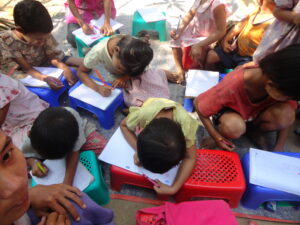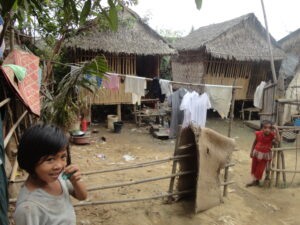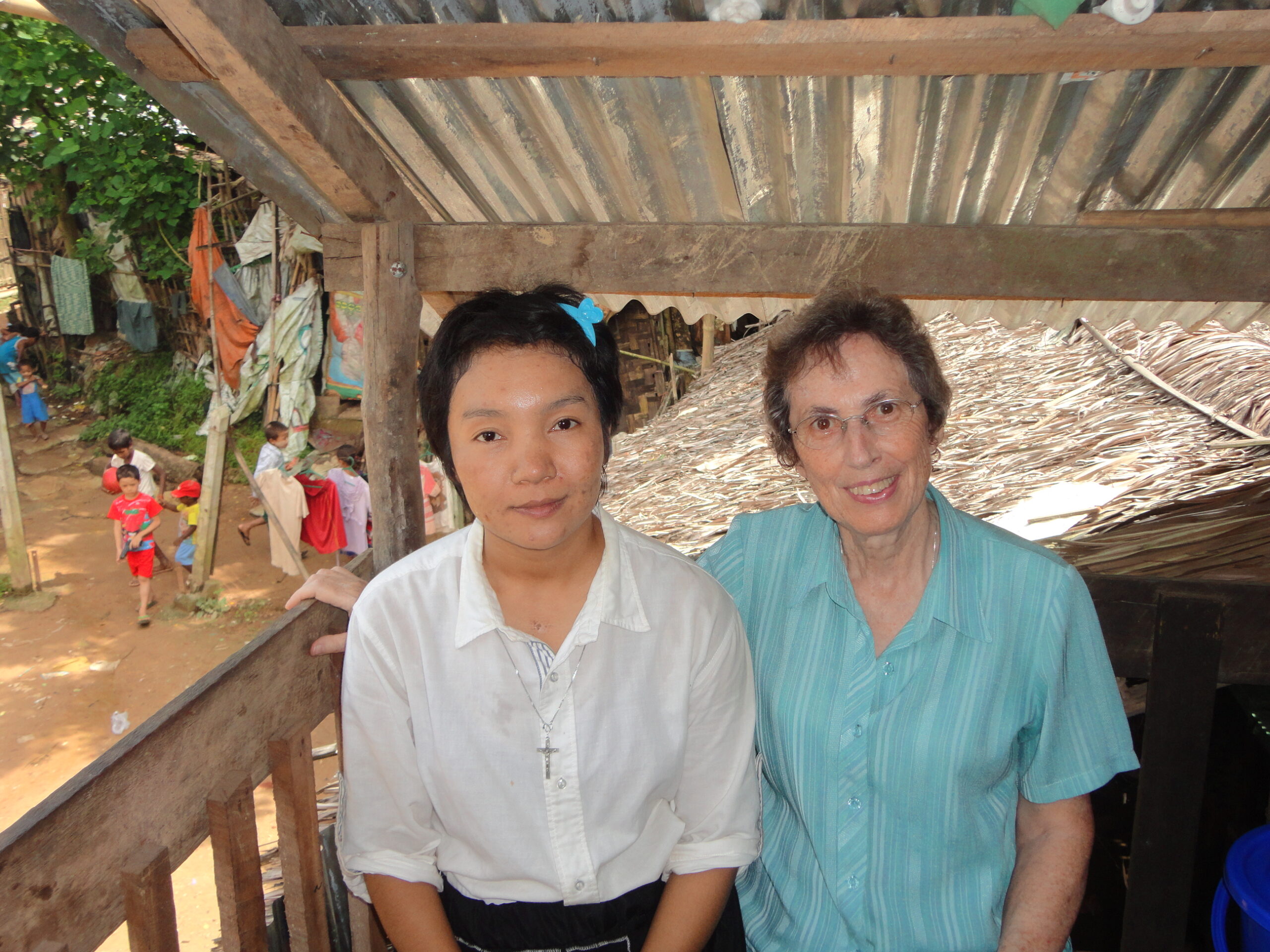Sr Kathleen Coyle writes about Mary Man’s incredible work in Myanmar to feed and educate children in the slums of Yangon and the detrimental effect of the military coup on this project.
Wakein village can hardly be called a village. It is a large depressed slum area on the outskirts of Yangon city in Myanmar. People live in abject poverty in shanties, with neither water nor electricity. These shanties are connected to each other by a muddy path that leads from house to house and ends in a side road at the back of an ancient Buddhist monastery.
When the military junta took over Myanmar in 1964, embassies, industries and factories were closed, jobs were lost, families moved to depressed areas like Wakein and set up temporary shelters made of four bamboo rods and a sack covering until they could afford more durable material. These shacks have now become their homes.
While men live in hope of casual construction work, the women sift through garbage, collect discarded plastics or sell food in the marketplace to provide for their children. The nearest government school to Wakein is a 50-minute walk away and pupils have to provide their own uniform, textbooks, and pay an annual fee. The children of Wakein could not afford this expense so they have never gone to school.
In 2003, Mary Man was in her senior year at the Myanmar Institute of Religious Studies in Yangon when she saw a woman rummaging through a bin. After an initial conversation she accompanied her on the bus to Wakein where she saw the devastating poverty of the area with neither shop nor school. Graduating from college, she committed herself to providing education for these poverty-stricken children.
With a generous donation from Combined Services Third World Fund, Dublin, a more durable building was constructed. A brick foundation was added and the gravel floor was cemented. A picture of the Buddha in the classroom assured the local leaders that we Christians were not building a church.
Mary Man became director of the programme as well as principal of the school. She soon discovered that most of the children survived on one meal a day. They needed nourishing food as well as education. At this time I was in Dublin preparing to return to Manila via Yangon when the Oblate Fathers in Inchicore, Dublin, surprised me with a very generous donation. With this money we began our Wakein Educational Centre.

In 2003, Mary Man committed herself to providing education for the poverty-stricken children of Yangon’s Wakein slums, many of whom had never attended school before.
Our goal was to give every child a nourishing snack before class and a substantial meal at 3pm before they went home. A library with benches, books, and colourful charts was set up as well as a much-needed outdoor kitchen. Soon the numbers increased, and between 300-390 children between the ages of three and nine came every day for class and for food.
Zaw, a six-year-old child held on to his bowl but refused to eat. His grandmother had eaten nothing that day and he wanted to share his dinner with her. To his delight, Mary Man gave him another bowl for his grandmother. By the end of the week every grandmother in Wakein was receiving a nourishing meal.
That meant more chickens, more eggs, more rice, and more charcoal for the fire so we went scrambling with our begging bowls to our benefactors who supported us generously for the next number of years. As the school progressed, children’s health improved with nourishment and they spent most of the day in the library with its colourful charts and books or outside playing ball by the side of the school.

When the military junta took over Myanmar in 1964, families moved to depressed areas like Wakein and set up temporary shelters. These shacks have now become their homes.
As the number of children in the school increased so did the needs of the youth who had graduated. When Indra, a 16-year-old girl needed work Mary Man bought her a sewing machine and got a seamstress to teach her to sew. She in turn taught a few more teenagers so another machine was bought for them. When Kyi, a six-year-old girl, enrolled she still hadn’t learnt to walk. With a toy motorcycle she learned to grip the handlebars and walk it along, thus exercising her leg muscles.
At a gathering of teenagers it was noted that Tera, a 15-year old was missing from the community. After two days of inquiries and home visitation Mary Man learnt that she was promised well paid employment. She became suspicious and followed the trail of her story until she was found in a safe house being groomed with other girls for prostitution.
Finally, she was secretly able to rescue Tera and one other girl but when they got to the front door the young officer refused to allow them to leave. Mary talked to him briefly and when she placed 100 kyats (€10) under his collar, he released the latch.
In 2021 there was a military coup in the country and Ang San Suu Kyi was sentenced to 33 years in jail. The military carried out a brutal, nationwide crackdown on the millions of people opposed to its rule. The fear and cruelty of the military was severely felt in Wakein.
A few months ago while Mary Man was preparing for class a number of strong men came in, took her wallet and phone and ransacked the school, taking with them many of the school’s belongings including the kitchen pots and pans.
The writing was on the wall. Under the present military regime classes and meals had to be cancelled; it was too dangerous to come to school or use its building. The first Wakein primary school had to close. When she informed the parents the news was received with great sadness. How were they going to feed their children and what about their schooling?
There was nothing left now for Mary but to pack up her few belongings. Her 20-year-old school was now closed. Fortunately, a group of young French missionaries, the Children of the Mekong River offered a monthly donation for food. Mary can take comfort in the fact that two generations of children in Wakein can read and write and find employment. Hopefully they in turn will encourage their children to study.
Columban missionary Sr Kathleen Coyle has taught theology in the East Asian Pastoral Institute in the Philippines. She now resides in Ireland.


